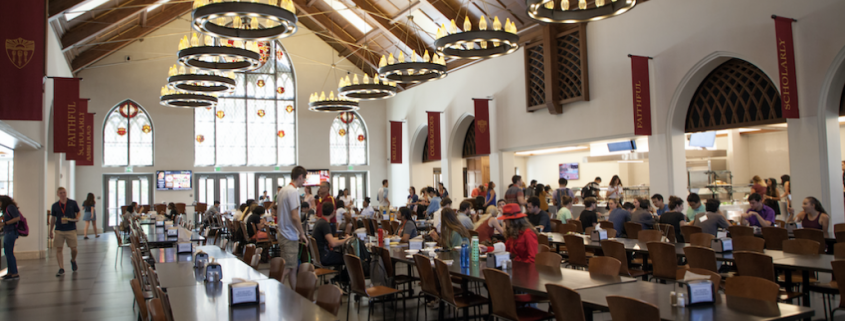University changes Cardinal meal plan

USC Hospitality made changes to the meal plans offered for student dining, with the 2022-2023 Cardinal Plan allowing unlimited meal swipes at any of the three on-campus residential dining halls and a limit of two weekly swipes at the Ronald Tutor Campus Center, a court popular among students for its quick-service restaurants, such as Mexican grill Verde and smoothie bar C&G Juice.
The Cardinal Plan, required for all freshmen living in USC Housing and sophomores, juniors and seniors living in Housing Residence Halls and Suites, previously allotted 19 weekly swipes to be used at most campus dining facilities, including the RTCC, Popovich Cafe and the Law Cafe in addition to the three residential dining halls — Everybody’s Kitchen, Parkside Restaurant & Grill and USC Village Dining Hall. The unlimited dining program in place before the coronavirus pandemic began was temporarily replaced with the limited 19-swipe plan, now reversed.
“As in pre-pandemic years, the unlimited plans support the Residential College Experience, which provide an opportunity for students to create new connections and bridge learning through conversations over a meal in the various dining halls,” USC Hospitality said in a statement to the Daily Trojan.
In an Aug. 23 email to students ahead of the fall 2021 semester, USC Hospitality introduced the RTCC’s function as a “fourth residential dining hall.” Located near the unofficial center of campus — the Tommy Trojan statue on Trousdale Parkway — RTCC serves as a hub for students who prefer a quick meal or smoothie over a sit-down meal at one of the residential dining halls, from which students may not take away any food except for pieces of fruit.
The meal plan modifications also include a new Cardinal Flex Plan “for students who need more flexibility,” USC Hospitality said, which will cost $3,715 a semester compared to the Cardinal Plan’s semesterly price of $3,465. Compared to the Spring 2022 Cardinal Plan price of $3,315, the new plans are a hike of $400 and $150, respectively. The Flex plan includes 50 meal swipes per semester to be used for special meal combos at Seeds Marketplace, The Kitchen, Verde and Burger Crush on top of unlimited admission to the three dining halls. The Gold Plan, which includes 500 Dining Dollars that can be used on any items sold at all USC Hospitality retail venues, was brought back for the coming school year.
The reintroduction of unlimited swipes under the Cardinal Plan elicited some uncertainty from meal swipe donation groups such as Meaningful Meals and Trojans Give Back, which recently incorporated a Dining Dollar donation mechanism into the USC Mobile Order app. In the past year, the organizations collected weekly donations from students with unused meal swipes that would otherwise become null and void when the 19-swipe count was reset. Meal swipes were then used to buy transportable meals and snacks to donate to students in need and residents of the surrounding South Central community.
Founder of Trojans Give Back and Undergraduate Student Government senator Yoav Gillath said the change puts into question the organization’s ability to conduct its operations, as it relies on meals and snacks from campus quick-service restaurants, including the RTCC.
“We’re hoping to be able to get some sort of swipe donation mechanism going,” said Gillath, a rising sophomore majoring in political economy. “That’s gonna have to probably be more through institutional means now that USC is kind of taking away our ability to do it on our own. But I am optimistic — I think there is an appetite for this.”
Preston Doll, a rising sophomore majoring in business administration and a member of Meaningful Meals, said he found the timing of the meal plan update during the summer and without any official communication to students “very cheeky.” Though he said he doesn’t want to overthink the University’s motive for the change, it is “confusing” to him, and he said he’s somewhat concerned about dining hall capacity with the unlimited swipes program.
“We only have three dining halls, and they’re always almost full,” Doll said. “Cafes are hardly ever occupied to the same capacity. So I can’t imagine how much more traffic that would be for the dining halls if students with that meal plan are being limited to two swipes [at the RTCC] per week.”
The new basic Cardinal Plan may pose inconveniences and impracticality for students who enjoyed the flexibility of the 2021-2022 meal plans, said Jacob Young, a member of Meaningful Meals and a rising sophomore majoring in political science and political economy.
“I’m pretty disappointed because you’re just so significantly limited to where you can eat now. And let’s say you want to study and just grab a burrito from Verde and take it back to your office, that’s no longer an option — you have to go to the dining hall and wait in the lines and those places are going to be a lot more crowded now … because it’s not spread out over the campus,” Young said. “It just makes the whole meal process a lot more difficult.”

